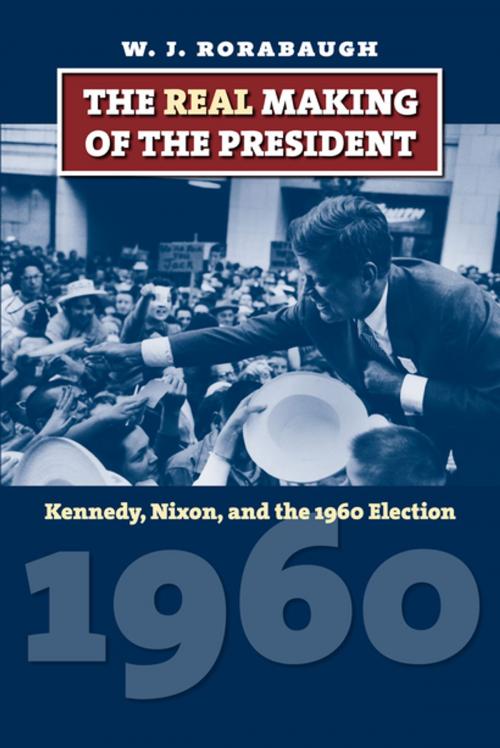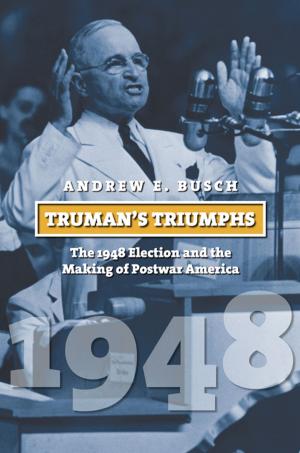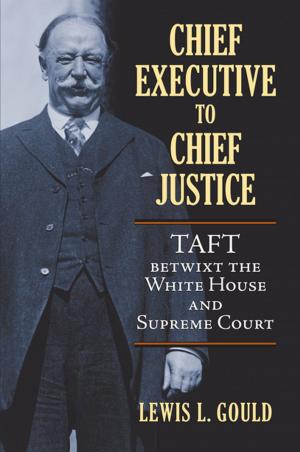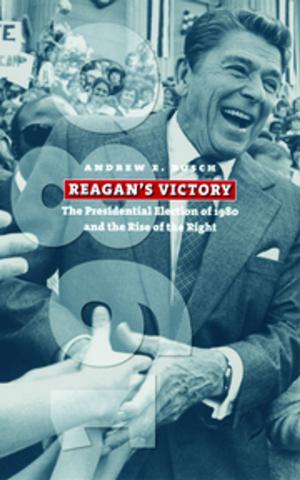The Real Making of the President
Kennedy, Nixon, and the 1960 Election
Nonfiction, Social & Cultural Studies, Political Science, Government, Elections, Politics, History & Theory, History, Americas, United States, 20th Century| Author: | W. J. Rorabaugh | ISBN: | 9780700625406 |
| Publisher: | University Press of Kansas | Publication: | October 20, 2017 |
| Imprint: | University Press of Kansas | Language: | English |
| Author: | W. J. Rorabaugh |
| ISBN: | 9780700625406 |
| Publisher: | University Press of Kansas |
| Publication: | October 20, 2017 |
| Imprint: | University Press of Kansas |
| Language: | English |
When John Kennedy won the presidency in 1960, he also won the right to put his own spin on the victory—whether as an underdog's heroic triumph or a liberal crusader's overcoming special interests. Now W. J. Rorabaugh cuts through the mythology of this famous election to explain the nuts-and-bolts operations of the campaign and offer a corrective to Theodore White's flawed classic, The Making of the President.
War hero, champion of labor, and Pulitzer Prize-winning author, JFK was long on charisma. Despite a less than liberal record, he assumed the image of liberal hero—thanks to White and other journalists who were shamelessly manipulated by the Kennedy campaign. Rorabaugh instead paints JFK as the ideological twin of Nixon and his equal as a bare-knuckled politician, showing that Kennedy's hard-won, razor-thin victory was attributable less to charisma than to an enormous amount of money, an effective campaign organization, and television image-making.
The 1960 election, Rorabaugh argues, reflects the transition from the dominance of old-style boss and convention politics to the growing significance of primaries, race, and especially TV—without which Kennedy would have been neither nominated nor elected. He recounts how JFK cultivated delegates to the 1960 Democratic convention; quietly wooed the still-important party bosses; and used a large personal organization, polls, and TV advertising to win primaries. JFK's master stroke, however, was choosing as a running mate Lyndon Johnson, whose campaigning in the South carried enough southern states to win the election.
On the other side, Rorabaugh draws on Nixon's often-ignored files to take a close look at his dysfunctional campaign, which reflected the oddities of a dark and brooding candidate trapped into defending the Eisenhower administration. Yet the widely detested Nixon won almost as many votes as the charismatic Kennedy, even though Democrats outnumbered Republicans by three to two. This leads Rorabaugh to reexamine the darker side of the election: the Republicans' charges of vote fraud in Illinois and Texas, the use of money to prod or intimidate, manipulation of the media, and the bulldozing of opponents.
White and others helped shape persisting impressions of both candidates, influencing the way Nixon conducted subsequent campaigns and the Democrats nurtured the Kennedy legacy. The Real Making of the President gives us a more sobering look at all of that, fundamentally reshaping our understanding of one of the nation's most memorable elections.
When John Kennedy won the presidency in 1960, he also won the right to put his own spin on the victory—whether as an underdog's heroic triumph or a liberal crusader's overcoming special interests. Now W. J. Rorabaugh cuts through the mythology of this famous election to explain the nuts-and-bolts operations of the campaign and offer a corrective to Theodore White's flawed classic, The Making of the President.
War hero, champion of labor, and Pulitzer Prize-winning author, JFK was long on charisma. Despite a less than liberal record, he assumed the image of liberal hero—thanks to White and other journalists who were shamelessly manipulated by the Kennedy campaign. Rorabaugh instead paints JFK as the ideological twin of Nixon and his equal as a bare-knuckled politician, showing that Kennedy's hard-won, razor-thin victory was attributable less to charisma than to an enormous amount of money, an effective campaign organization, and television image-making.
The 1960 election, Rorabaugh argues, reflects the transition from the dominance of old-style boss and convention politics to the growing significance of primaries, race, and especially TV—without which Kennedy would have been neither nominated nor elected. He recounts how JFK cultivated delegates to the 1960 Democratic convention; quietly wooed the still-important party bosses; and used a large personal organization, polls, and TV advertising to win primaries. JFK's master stroke, however, was choosing as a running mate Lyndon Johnson, whose campaigning in the South carried enough southern states to win the election.
On the other side, Rorabaugh draws on Nixon's often-ignored files to take a close look at his dysfunctional campaign, which reflected the oddities of a dark and brooding candidate trapped into defending the Eisenhower administration. Yet the widely detested Nixon won almost as many votes as the charismatic Kennedy, even though Democrats outnumbered Republicans by three to two. This leads Rorabaugh to reexamine the darker side of the election: the Republicans' charges of vote fraud in Illinois and Texas, the use of money to prod or intimidate, manipulation of the media, and the bulldozing of opponents.
White and others helped shape persisting impressions of both candidates, influencing the way Nixon conducted subsequent campaigns and the Democrats nurtured the Kennedy legacy. The Real Making of the President gives us a more sobering look at all of that, fundamentally reshaping our understanding of one of the nation's most memorable elections.















